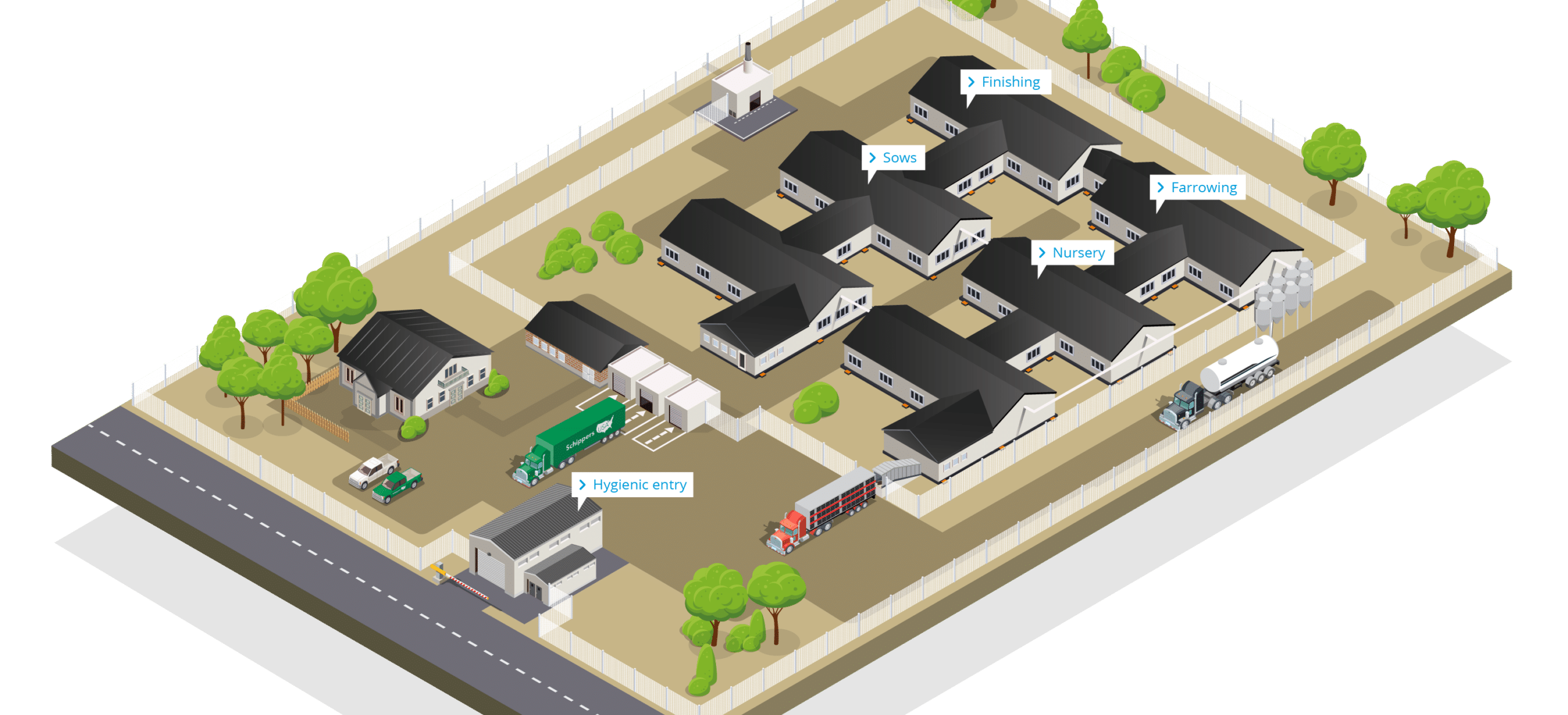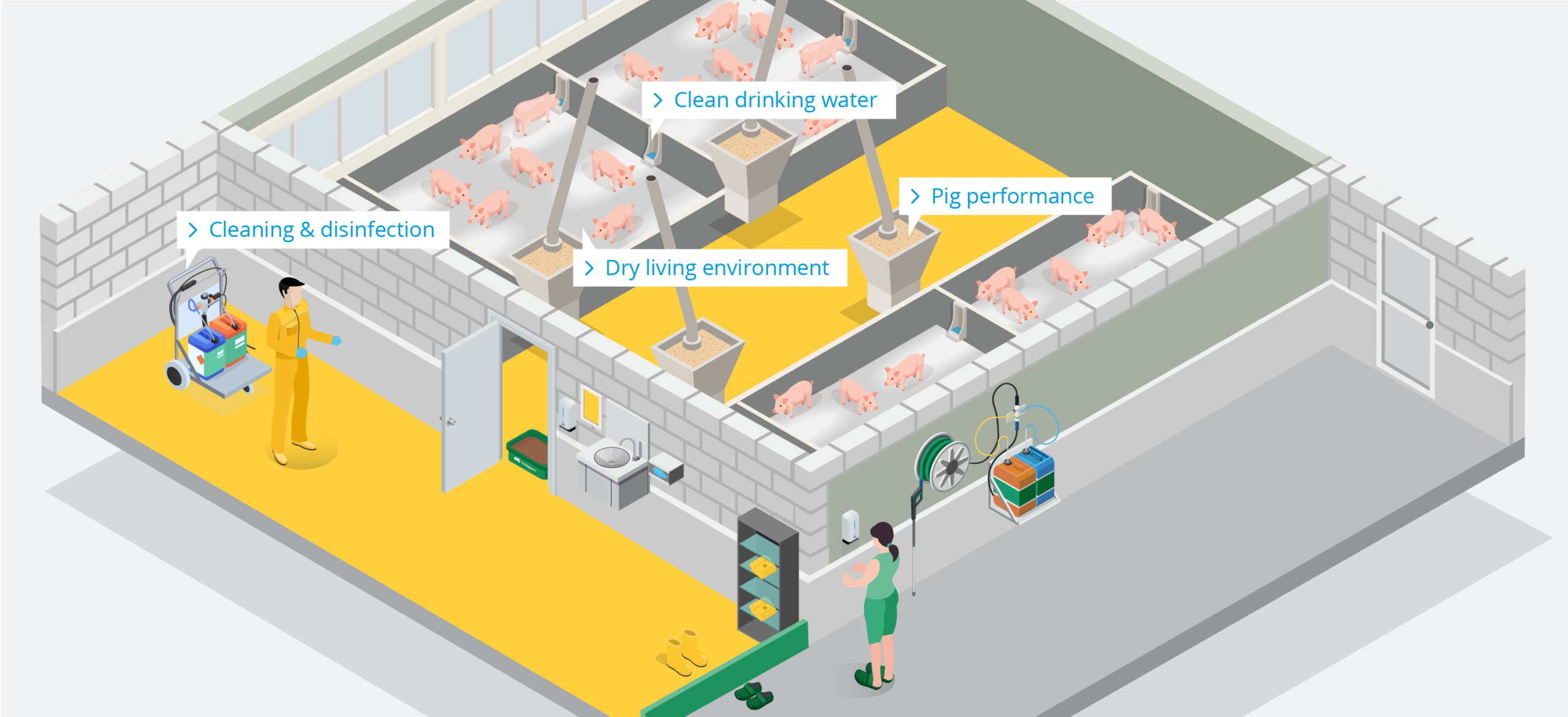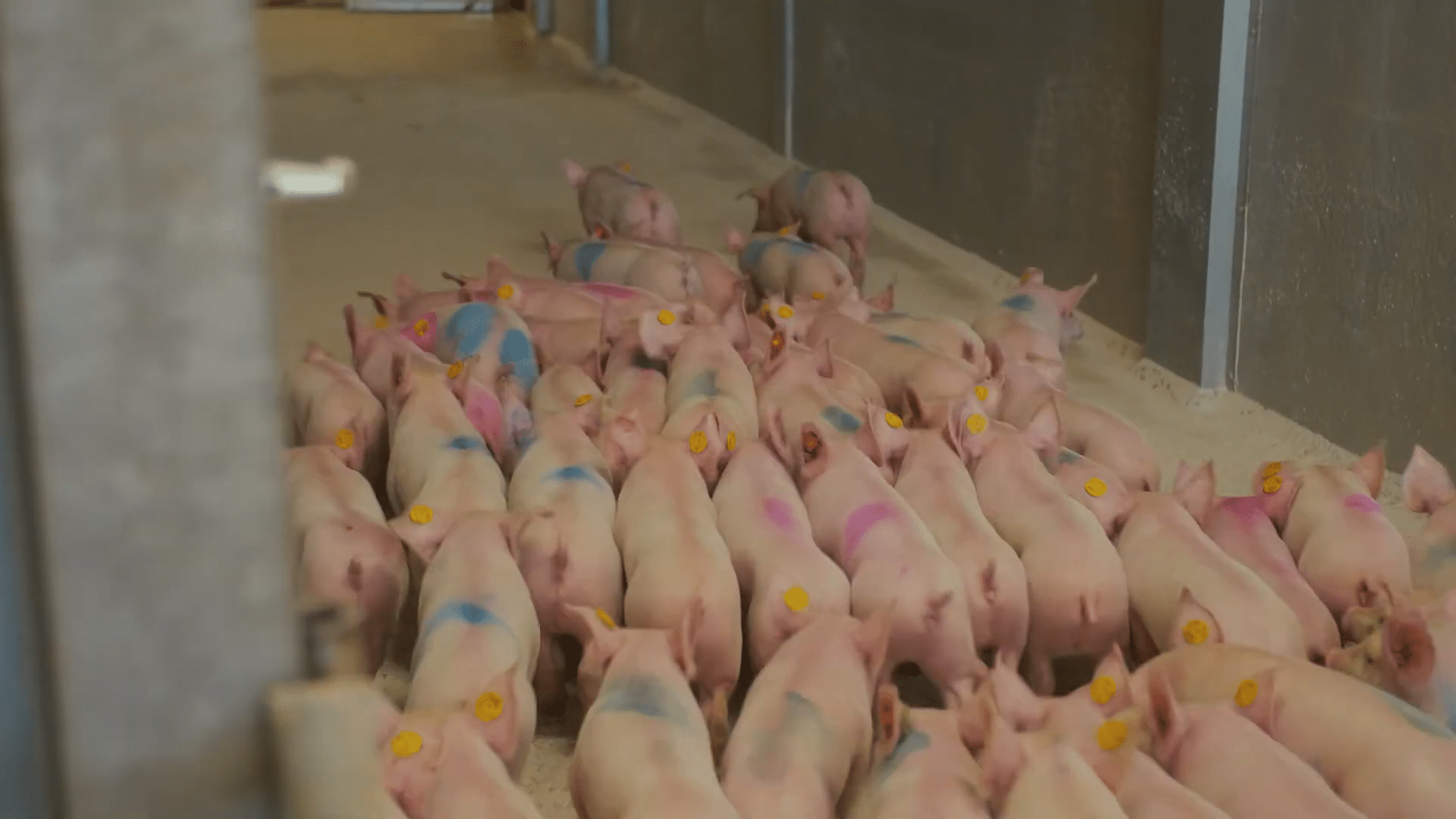
Sows
Improve the success rate of sow insemination, create a healty environment in the pregnancy area to maximize sow health and preventing cross-contamination before the transfer to the farrowing pen.
Finishing
The finishing phase is financially the most important. The herd consumes the most feed in this phase and animals stay in it for the longest period. Optimization and disease control significantly influence overall growth. Swine farm profitability and their efficiency highly depend on the performance in this phase.
Farrowing
Reducing pathogen pressure on newborn piglets in the early stages of their life significantly improves their performance during their entire life-cycle.
Nursery
Animals never get over a bad start, so it is critical to provide weaning piglets with healthy drinking water and an ideal germ-free growing environment to reach their full genetic potential.
Hygienic entry
External biosecurity measures are aimed at keeping the pathogens outside the farm.
Biosecurity programsfor pig farms
Nursery
What’s important during this life stage?
Preventive biosecurity measures including providing weaning piglets with clean drinking water and a germ-free environment for optimal growth potential and to maintain their gut health, as it lays the groundwork for performance and profitability in pig production.
Improving growth performance: An animal never gets over a bad start, so it is critical to provide weaning piglets with optimal nutrition and an ideal growing environment in order to achieve maximum lifetime performance.
Improving gut intestinal morphology: Gut health is essential for building a foundation for performance and profitability in pig production. Healthy pigs will eat and produce more efficiently. Increasing feed intakes at weaning: Providing the necessary nutrients during this highly energy-dependent stage is important to ensuring that the pig can easily transition from liquid to solid food. Building immune health: If pigs aren’t eating well, gut health may be compromised, which can affect their overall health and make them more vulnerable to disease challenges.
Common challenges:
- Poor feed intakes at weaning: Weaning is the single biggest stressor in a pig’s life, so feeding weaned pigs can be a challenge. Pigs that do not transition well from milk to dry feed risk having their gut health compromised and falling victim to disease challenges.
- Poor health and an increase in treated animals: Health-challenged pigs tend to be problematic all the way through to market, so it’s vital for pigs to get off to the right start.
- Diarrhea: preventive focus is on these three areas: sanitation, pathogen control and proper nutrition.

Cleaning & disinfection
Implementing a rigorous cleaning and disinfection program between batches of pigs is crucial to prevent the transmission of diseases from one group to the next. To make sure no organic and or inorganic material will interfere with the disinfection process, foam cleaning must be done prior to disinfection. Foam actively penetrates and breaks down contamination and reduces pathogen pressure.
Dry living environment
In a nursery, pigs will stay for a relatively long period of time. Hygiene powders are used to create and maintain a dry living environment:
- 1.Preparation before entry
- 2. Environmental control during the round
The application of MS DryCare in the nursery or finisher stables helps to absorb moisture, reduce pathogen pressure, reduct fighting by provide a smell that is similar to all pigs, and makes sure the pigs stay dry and warm.
The application can be done via closed floor application or all room application. The application of MS DryCare in the nursery helps with environmental control
Benefits: Reduction of bacteria and viruses such as: e. coli bacteria, clostridium bacteria, rotaviruses, PED virus or coccidiosis.
Pigs stay warm and lose less energy heating themselves

Clean drinking water
The first week post-weaning is a crucial period for the development of a pig’s digestive physiology. During this time, piglets undergo a dietary transition from a liquid-based diet to one that includes plant proteins. In this phase, water assumes a vital role in various essential processes within the pig’s body. These processes include thermoregulation, feed digestion, nutrient transport, and the elimination of waste products.
The HyCare clean drinking water program ensures the availability of healthy drinking water at all times.

Pig performance
Organic acids are commonly used in swine production to acidify drinking water, serving the purpose of inhibiting bacterial growth in the gastrointestinal (GI) tract. This acidification not only reduces bacterial proliferation but also aids in enhancing protein digestion and promoting optimal gut health. This is achieved by maintaining the natural low pH levels in the stomach and small intestines.
During the critical phase of the first week post-weaning, piglets undergo significant development in their digestive physiology. With the transition from a liquid-based diet to plant proteins, they face new challenges, including the absence of lactogenic immunity and exposure to unfamiliar bacterial pathogens. Acidifying the water can be beneficial in this context as it helps lower the pH of the digestive tract contents. By doing so, it assists in combating bacterial colonization and mitigating potential health issues that could affect the pig’s well-being.
Implementing a rigorous cleaning and disinfection program between batches of pigs is crucial to prevent the transmission of diseases from one group to the next. To make sure no organic and or inorganic material will interfere with the disinfection process, foam cleaning must be done prior to disinfection. Foam actively penetrates and breaks down contamination and reduces pathogen pressure.
In a nursery, pigs will stay for a relatively long period of time. Hygiene powders are used to create and maintain a dry living environment:
- 1.Preparation before entry
- 2. Environmental control during the round
The application of MS DryCare in the nursery or finisher stables helps to absorb moisture, reduce pathogen pressure, reduct fighting by provide a smell that is similar to all pigs, and makes sure the pigs stay dry and warm.
The application can be done via closed floor application or all room application. The application of MS DryCare in the nursery helps with environmental control
Benefits: Reduction of bacteria and viruses such as: e. coli bacteria, clostridium bacteria, rotaviruses, PED virus or coccidiosis.
Pigs stay warm and lose less energy heating themselves

The first week post-weaning is a crucial period for the development of a pig’s digestive physiology. During this time, piglets undergo a dietary transition from a liquid-based diet to one that includes plant proteins. In this phase, water assumes a vital role in various essential processes within the pig’s body. These processes include thermoregulation, feed digestion, nutrient transport, and the elimination of waste products.
The HyCare clean drinking water program ensures the availability of healthy drinking water at all times.

Organic acids are commonly used in swine production to acidify drinking water, serving the purpose of inhibiting bacterial growth in the gastrointestinal (GI) tract. This acidification not only reduces bacterial proliferation but also aids in enhancing protein digestion and promoting optimal gut health. This is achieved by maintaining the natural low pH levels in the stomach and small intestines.
During the critical phase of the first week post-weaning, piglets undergo significant development in their digestive physiology. With the transition from a liquid-based diet to plant proteins, they face new challenges, including the absence of lactogenic immunity and exposure to unfamiliar bacterial pathogens. Acidifying the water can be beneficial in this context as it helps lower the pH of the digestive tract contents. By doing so, it assists in combating bacterial colonization and mitigating potential health issues that could affect the pig’s well-being.

Contact our swine specialist
Carlos Zepeda
Carlos Zepeda is the Technical Biosecurity Specialist Swine for Schippers USA